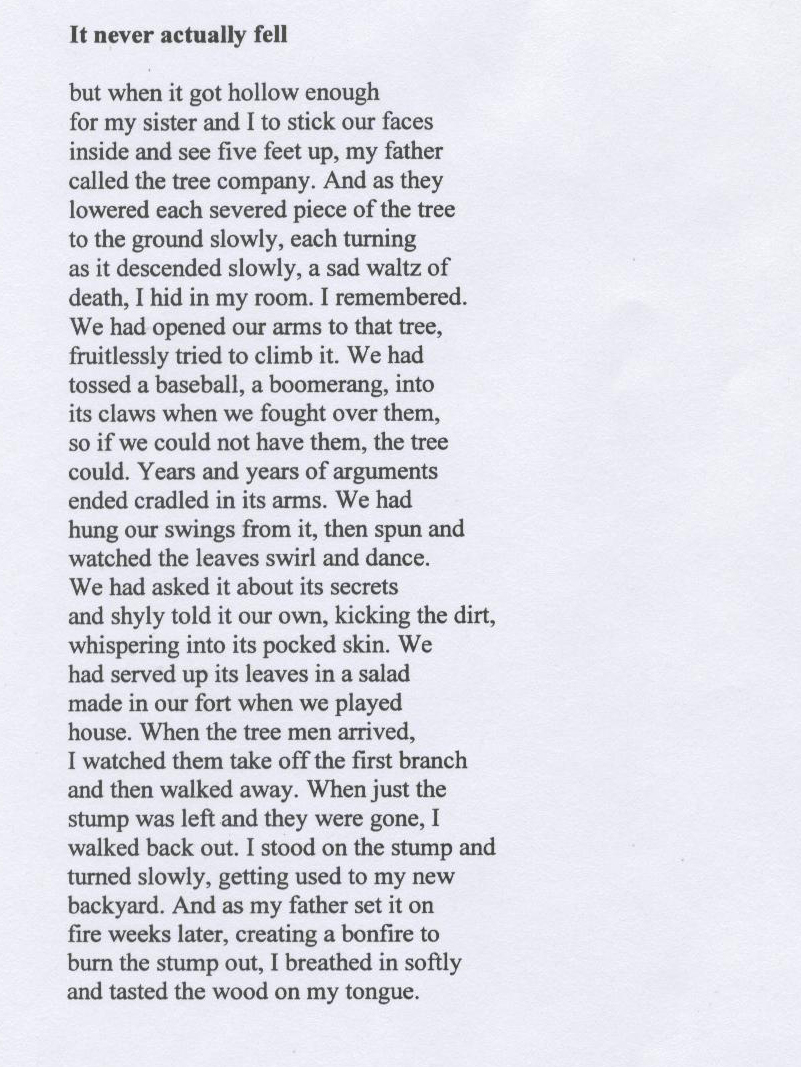2012
SARAH MOOK
POETRY PRIZE RESULTS
9-12 SECOND PLACE
Emily
Masters
Allendale, NJ
 |
|
COMMENTS FROM CONTEST JUDGE MARIE KANE: The second place poem in this age group captivates the reader from the opening. This narrative poem uses flashback and resonates with original images, skillful diction, and expressive detail. The line breaks are outstanding, and the use of personification is mature. The poem discusses the cutting down of a favorite childhood tree with honest, and understated, emotion. The poem is structured in one section that absolutely suits the topic; the short lines and resulting white space remind one of a tree trunk. The first four lines continue from the title, "It never actually fell," and adroitly set the scene for the poem:
The breaks at "enough," "faces," and "father" are excellent; they carry greater emphasis because of their last-word status. I like that calling the "tree company" is delayed in the poem until the fourth line. One can absolutely picture the sisters "sticking [their] faces inside" the hollow insides of this tree. The poem continues with the unfortunate actions of cutting down the tree. The speaker tells us that "I hid in my room" as "each severed piece" of the tree was "lowered to the ground slowly," "each turning," as it "descended slowly" in a "sad waltz of death." Notice how the repetition of "each" and "slowly" intensifies the emotions of losing the tree, as does the terrific metaphor, "sad waltz of death." To develop the narrative further, the speaker uses flashback to examine the tree's importance for both herself and her sister. Echoing a metaphor for the limbs of the tree, the speaker remembers that they had "opened our arms to that tree," and "fruitlessly tried to climb it." Next, memories relate the tree's importance in their lives; they had
What an excellent image the above lines evoke! The tree is seen as crucial to the sisters' youth and their games and disagreements that ended "cradled in its arms." Other memories continue in the next eight lines. The sisters "hung their swings from it; then spun and / watched the leaves swirl and dance." Private revelations explain that they "had asked it about its secrets / and shyly told it our own, kicking the dirt, / whispering into its pocked skin." Their play with the tree included serving "up its leaves in a salad / made in our fort when we played / house." The importance of the tree is clear; personified as a friend, the reader fully understands the speaker's grief at its loss. The following section returns to the present with the actual cutting down of the tree. The speaker's reaction is telling:
Note the repetition of the adverb "slowly"; it was used earlier in the poem to describe the "tree men" cutting and lowering the tree's branches. Its use here modifies the speaker's intense emotions at losing the tree, her own kind of "sad waltz of death." The
speaker concludes the poem with events weeks later. Her father "set
it on / fire, creating This expressive poem does not overstate its case, nor does it stand dispassionately back. The evocative language is elegiac and expresses in exact detail what it is like to lose something significant, something memorable, and something remarkable. This is a poet who can render truth and emotion with care. Thank you for the privilege of reading your work! Marie
Kane |